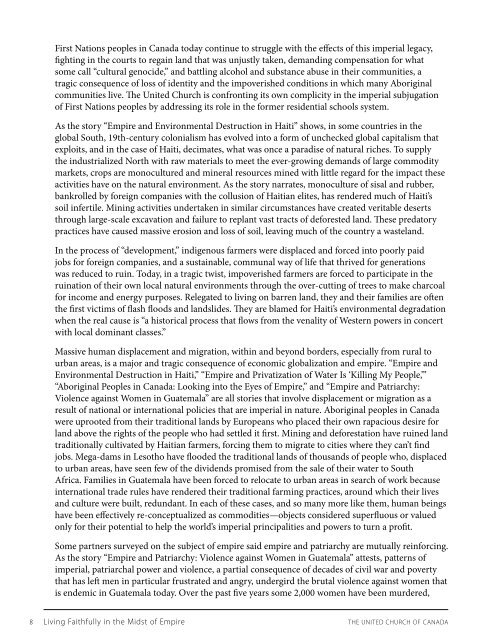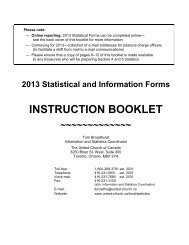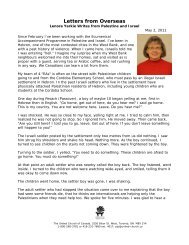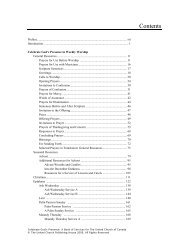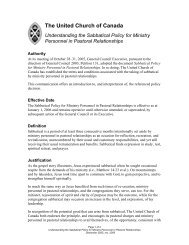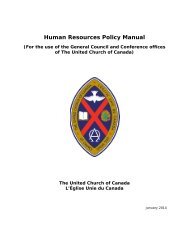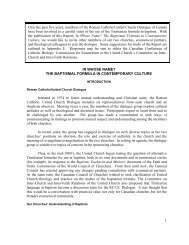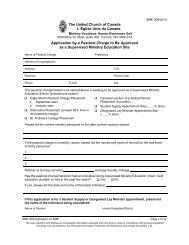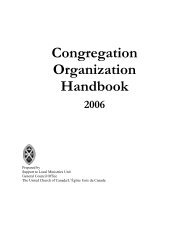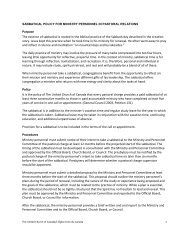Living Faithfully in the Midst of Empire - The United Church of Canada
Living Faithfully in the Midst of Empire - The United Church of Canada
Living Faithfully in the Midst of Empire - The United Church of Canada
Create successful ePaper yourself
Turn your PDF publications into a flip-book with our unique Google optimized e-Paper software.
First Nations peoples <strong>in</strong> <strong>Canada</strong> today cont<strong>in</strong>ue to struggle with <strong>the</strong> effects <strong>of</strong> this imperial legacy,<br />
fight<strong>in</strong>g <strong>in</strong> <strong>the</strong> courts to rega<strong>in</strong> land that was unjustly taken, demand<strong>in</strong>g compensation for what<br />
some call “cultural genocide,” and battl<strong>in</strong>g alcohol and substance abuse <strong>in</strong> <strong>the</strong>ir communities, a<br />
tragic consequence <strong>of</strong> loss <strong>of</strong> identity and <strong>the</strong> impoverished conditions <strong>in</strong> which many Aborig<strong>in</strong>al<br />
communities live. <strong>The</strong> <strong>United</strong> <strong>Church</strong> is confront<strong>in</strong>g its own complicity <strong>in</strong> <strong>the</strong> imperial subjugation<br />
<strong>of</strong> First Nations peoples by address<strong>in</strong>g its role <strong>in</strong> <strong>the</strong> former residential schools system.<br />
As <strong>the</strong> story “<strong>Empire</strong> and Environmental Destruction <strong>in</strong> Haiti” shows, <strong>in</strong> some countries <strong>in</strong> <strong>the</strong><br />
global South, 19th-century colonialism has evolved <strong>in</strong>to a form <strong>of</strong> unchecked global capitalism that<br />
exploits, and <strong>in</strong> <strong>the</strong> case <strong>of</strong> Haiti, decimates, what was once a paradise <strong>of</strong> natural riches. To supply<br />
<strong>the</strong> <strong>in</strong>dustrialized North with raw materials to meet <strong>the</strong> ever-grow<strong>in</strong>g demands <strong>of</strong> large commodity<br />
markets, crops are monocultured and m<strong>in</strong>eral resources m<strong>in</strong>ed with little regard for <strong>the</strong> impact <strong>the</strong>se<br />
activities have on <strong>the</strong> natural environment. As <strong>the</strong> story narrates, monoculture <strong>of</strong> sisal and rubber,<br />
bankrolled by foreign companies with <strong>the</strong> collusion <strong>of</strong> Haitian elites, has rendered much <strong>of</strong> Haiti’s<br />
soil <strong>in</strong>fertile. M<strong>in</strong><strong>in</strong>g activities undertaken <strong>in</strong> similar circumstances have created veritable deserts<br />
through large-scale excavation and failure to replant vast tracts <strong>of</strong> deforested land. <strong>The</strong>se predatory<br />
practices have caused massive erosion and loss <strong>of</strong> soil, leav<strong>in</strong>g much <strong>of</strong> <strong>the</strong> country a wasteland.<br />
In <strong>the</strong> process <strong>of</strong> “development,” <strong>in</strong>digenous farmers were displaced and forced <strong>in</strong>to poorly paid<br />
jobs for foreign companies, and a susta<strong>in</strong>able, communal way <strong>of</strong> life that thrived for generations<br />
was reduced to ru<strong>in</strong>. Today, <strong>in</strong> a tragic twist, impoverished farmers are forced to participate <strong>in</strong> <strong>the</strong><br />
ru<strong>in</strong>ation <strong>of</strong> <strong>the</strong>ir own local natural environments through <strong>the</strong> over-cutt<strong>in</strong>g <strong>of</strong> trees to make charcoal<br />
for <strong>in</strong>come and energy purposes. Relegated to liv<strong>in</strong>g on barren land, <strong>the</strong>y and <strong>the</strong>ir families are <strong>of</strong>ten<br />
<strong>the</strong> first victims <strong>of</strong> flash floods and landslides. <strong>The</strong>y are blamed for Haiti’s environmental degradation<br />
when <strong>the</strong> real cause is “a historical process that flows from <strong>the</strong> venality <strong>of</strong> Western powers <strong>in</strong> concert<br />
with local dom<strong>in</strong>ant classes.”<br />
Massive human displacement and migration, with<strong>in</strong> and beyond borders, especially from rural to<br />
urban areas, is a major and tragic consequence <strong>of</strong> economic globalization and empire. “<strong>Empire</strong> and<br />
Environmental Destruction <strong>in</strong> Haiti,” “<strong>Empire</strong> and Privatization <strong>of</strong> Water Is ‘Kill<strong>in</strong>g My People,’”<br />
“Aborig<strong>in</strong>al Peoples <strong>in</strong> <strong>Canada</strong>: Look<strong>in</strong>g <strong>in</strong>to <strong>the</strong> Eyes <strong>of</strong> <strong>Empire</strong>,” and “<strong>Empire</strong> and Patriarchy:<br />
Violence aga<strong>in</strong>st Women <strong>in</strong> Guatemala” are all stories that <strong>in</strong>volve displacement or migration as a<br />
result <strong>of</strong> national or <strong>in</strong>ternational policies that are imperial <strong>in</strong> nature. Aborig<strong>in</strong>al peoples <strong>in</strong> <strong>Canada</strong><br />
were uprooted from <strong>the</strong>ir traditional lands by Europeans who placed <strong>the</strong>ir own rapacious desire for<br />
land above <strong>the</strong> rights <strong>of</strong> <strong>the</strong> people who had settled it first. M<strong>in</strong><strong>in</strong>g and deforestation have ru<strong>in</strong>ed land<br />
traditionally cultivated by Haitian farmers, forc<strong>in</strong>g <strong>the</strong>m to migrate to cities where <strong>the</strong>y can’t f<strong>in</strong>d<br />
jobs. Mega-dams <strong>in</strong> Lesotho have flooded <strong>the</strong> traditional lands <strong>of</strong> thousands <strong>of</strong> people who, displaced<br />
to urban areas, have seen few <strong>of</strong> <strong>the</strong> dividends promised from <strong>the</strong> sale <strong>of</strong> <strong>the</strong>ir water to South<br />
Africa. Families <strong>in</strong> Guatemala have been forced to relocate to urban areas <strong>in</strong> search <strong>of</strong> work because<br />
<strong>in</strong>ternational trade rules have rendered <strong>the</strong>ir traditional farm<strong>in</strong>g practices, around which <strong>the</strong>ir lives<br />
and culture were built, redundant. In each <strong>of</strong> <strong>the</strong>se cases, and so many more like <strong>the</strong>m, human be<strong>in</strong>gs<br />
have been effectively re-conceptualized as commodities—objects considered superfluous or valued<br />
only for <strong>the</strong>ir potential to help <strong>the</strong> world’s imperial pr<strong>in</strong>cipalities and powers to turn a pr<strong>of</strong>it.<br />
Some partners surveyed on <strong>the</strong> subject <strong>of</strong> empire said empire and patriarchy are mutually re<strong>in</strong>forc<strong>in</strong>g.<br />
As <strong>the</strong> story “<strong>Empire</strong> and Patriarchy: Violence aga<strong>in</strong>st Women <strong>in</strong> Guatemala” attests, patterns <strong>of</strong><br />
imperial, patriarchal power and violence, a partial consequence <strong>of</strong> decades <strong>of</strong> civil war and poverty<br />
that has left men <strong>in</strong> particular frustrated and angry, undergird <strong>the</strong> brutal violence aga<strong>in</strong>st women that<br />
is endemic <strong>in</strong> Guatemala today. Over <strong>the</strong> past five years some 2,000 women have been murdered,<br />
<strong>Liv<strong>in</strong>g</strong> <strong>Faithfully</strong> <strong>in</strong> <strong>the</strong> <strong>Midst</strong> <strong>of</strong> <strong>Empire</strong> THE UNITED CHURCH OF CANADA


